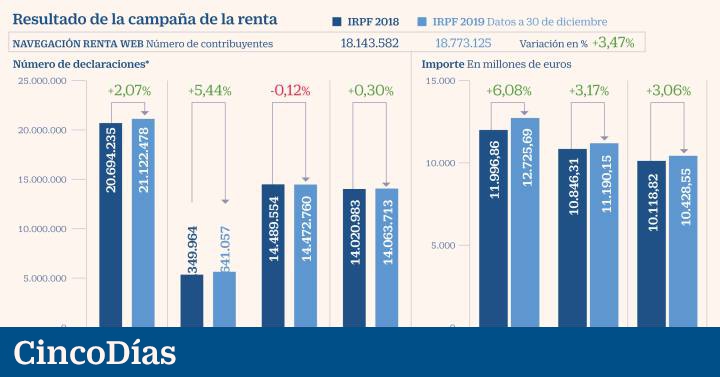
The coronavirus pandemic has dealt a severe blow to the Tax Agency’s collection capacity during 2020. Despite this, the public revenue debacle has been partially contained by the different tax settlement schedule. This is the case of the IRPF, in which the Income Campaign of last spring launched an increase in the declarations with result to pay the tax three times higher than the advance of the returns, when corresponding to the year 2019, prior to the Covid crisis.
This is derived from the data provided yesterday by the Tax Agency, which virtually ended the Income Tax Campaign held last year on the previous year’s tax data. The campaign concludes with the return of 10.4 billion euros to about 14 million taxpayers in a year marked by the rise of telematic declarations in the framework of the coronavirus pandemic.
To begin with, the number of declarations submitted increased by 2% to reach a new historical record, exceeding 21,120,000. Of these, 68.5% included a refund request (14,470,000) while the remaining 31.5% (5,640,000) resulted in a tax payment.
Nevertheless, the campaign resulted in a higher increase in the taxpayers subject to pay, as well as in the amounts to be paid by the tax authorities, which among those that were in their favor and collected from the Tax Agency. To understand this phenomenon, it must be borne in mind that the campaign ended a fiscal year, 2019, in which the economy slowed down but was still growing at 2%, as it was not yet affected by the Covid-19 pandemic. Its liquidation, however, comes in a year in which the economy suffered a downturn of around 11.2%, according to official government forecasts.
Thus, the number of declarations to be paid increased by 5.44% compared to the previous year, to 5,640,000, and the amounts to be received by the tax authorities rose by 6.08%, to 12,725. 000 euros.
For its part, the returns to be returned fell by 0.12%, to 14,470,000, while the amount returned was 11.19 billion euros, an increase of 3.17% compared to the result of the previous campaign, corresponding to the 2018 financial year.
As of this, the tax authorities have already returned 93% of the amounts claimed (10,428,000) to 97% of those interested (14,060,000 taxpayers).
Incidence in the box
This evolution, with a greater increase in the balances to be deposited in the public coffers than in those that have had to be returned to taxpayers, partly explains why the Ministry of Finance aspires to close a year of double-digit GDP fall with a reduction in revenue of only 7.6%.
Thus, at the end of November, public coffers had suffered a decline in tax collection of 9%, from 197,853,000 in the first 11 months of 2019 to 179,996,000 on the same date in 2020. However , in the case of personal income tax, the comparison showed a year-on-year increase of 1%, to 82,358,000. Even a comparison in homogeneous terms for the purpose of calendar limits the fall in personal income tax during 2020 to 0.3%, at the end of November. A limited impact given the severity of the economic crisis triggered by the pandemic and the fact that, acknowledges the Tax Agency, with the activation of ERTOs as a network of employment security “went from having subject wages to withholding to have benefits with little or no withholding “.
Remote statements
The 2019 Income Campaign has been characterized, in turn, by the increase in online returns. It is worth remembering that the process started as part of the closure of the Tax Agency offices, during the state of alarm last spring. While, Treasury ruled out delaying the campaign. Thus, the statements submitted through the telephone service “En diem” multiplied by six to 1,155,000.
For its part, the declarations made through the website of the Tax Agency (19,280,000, 6.9% more) and those made through the mobile application (another 365,000, 25.8% more) they reached 93% of the total of all the presented, in front of 88% that supposed these telematic declarations in the previous exercise.
New requirement for the SICAV to be taxed at 1%
The PSOE has presented several amendments to the anti-fraud law that is being processed in the Congress of Deputies, which include a tightening of the requirements for collective investment companies, the Sicavs, to be taxed at 1% in companies. Although a minimum of 100 members is already required to ensure that this tax advantage does not benefit all types of vehicles, the Socialists propose that a minimum participation of 2,500 euros per shareholder be required (12,500 euros in the case of SICAVs by sub-funds) to prevent the existence of so-called “mariachis” participants, which are only listed to allow the main investor to pay less taxes. The PSOE proposes that the change be accompanied by a six-month transitional regime, a gateway in which the dissolution and liquidation of a SICAV for this reason is exempt from the Tax on Property Transfers and Documented Legal Acts. In turn, the members will not have to integrate in the taxable base of the IRPF, the Corporation Tax or on the income of nonresidents those incomes derived from the liquidation whenever the money is reinvested before seven months. Its use for the purchase of securities will be exempt from the new Tobin tax.